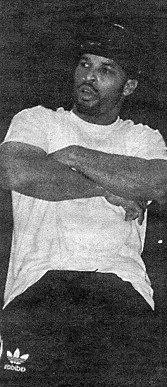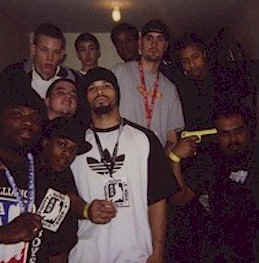| In a town that characterizes hip-hop with Easter,
DJ Rip and Scrib are spreading the word about a ghetto art form with one mission in mind:
Keepin' it real. |
|
Rocking
the B-Boy Language
By Tim
McMahan
|
|
Without knowing
his name, you'd figure out that DJ Rip is a DJ/emcee just by talking to him. He speaks
quickly, forcefully, and says what's on his mind right now, so you better be ready to take
it down. It's a language all its own. "What we do is hip-hop, 'cause we have the
four elements in everything we do. The lyrics go straight back to the original style of
emceeing: party rocking, straight skills, party rhymes and stories. Next, DJing with emcee
beat-making and scratching -- a lot of people don't even scratch anymore. Then you got the
graffiti, which is the art. And then you got the B-boying, -- the boys doing the dance
thing. You gotta have the four elements of hip-hop in one package, period."
What he's talking about is the original hip-hop style. Rip, real name Mike Dunham, and
B-boy/scribbler Houston Alexander -- who goes by Scrib or FAS/ONE -- have a vision that's
about hip-hop, Omaha and making it real again in a city that watched hip-hop die when the
gangsters moved in and killed the party.
|
 |
"What bring us together are the
four elements. Our objective is to preserve them because they're our history, our
culture."
|
Under
the guise of the Midwest Alliance, Rip and Alexander are bringing back the old-style
hip-hop to a city that forgot where it all came from. They're doing it by opening for
major urban-music superstars, like Digital Underground, Tone Loc, Ice-T, Fishbone, 2
Skinnee Js, Run DMC and Vanilla Ice. Next month they'll open the party for Salt 'n' Pepa
down in Lawrence, Kan. Meanwhile, back home, they're doing their thing at house parties
and schools, spreading the hip-hop message wherever they go.
Theirs isn't your ordinary show. DJ Rip is on the microphone and turntables, performing
tracks off his just-released CD, "Rock the B-Boy Language," while Alexander and
members of the Alliance All-Star B-boys do the dancing; with everyone surrounded by panels
of graffiti art.
Call it B-boying. Don't call it breakdancing, not around Alexander, anyway. He'll
quickly set you straight. "'Breakdance' is a slang term for the media," he says.
"Something they made up; something someone said. The media labeled it breakdancing
because at the time, they didn't know their own history."
Alexander explains it all from "the dungeon" -- Rip's homemade studio/bedroom
in the basement of his north Omaha home, leaning back in an overstuffed leather chair,
surrounded by walls covered in spray-painted tags, stickers and posters of hip-hop giants.
In one small corner is a homemade turntable bar and hundreds of vinyl albums in crates.
Alexander looks like an athlete, cut from years of gymnastic's style B-boying, he's casual
today in his old T and warm-ups; while Rip fits the stereotype of the New York DJ, like a
young Bobby De Niro sporting a goatee and an attitude.
This is the hip-hop headquarters of Midwest Alliance. "The
project involves the whole umbrella of artists," Rip says, "including the Rebel
All Starts, Rebel Na', TK and Lyrical Madness. What bring us together are the four
elements. Our objective is to preserve them because they're our history, our
culture."
|
|
|
It's a
point Alexander and Rip want to make perfectly clear. You gotta have the four elements for
true hip-hop. I have no idea what they are, so they spell them out, talking slowly so the
uninitiated doesn't get something wrong:
1) B-boying, or breakdancing for the layman, the spontaneous and
creative style of competitive, acrobatic and pantomimic dancing; 2) Graffiti art,
using spray paint to create large compositions, in a legal, public setting of course; 3) DJing,
the art of spinning records, whether for a dance party or for creating new music; and 4) Emceeing
or rapping. In the words of Afrika Bambaataa, the godfather of hip-hop, "it is the
fashion, the slang… a legitimate sub-culture within the realm of the urban
experience."
The Midwest Alliance uses the four elements in various formats, including its two
potential moneymakers: Alliance Records and managing the Alliance All-Star B-boys.
According to their investor proposal, Alliance Records was created to provide an outlet
for "the talented youth of the region who may otherwise lack the resources necessary
to put out a musical project." Acts committed to the label include Rip, Lyrical
Madness, Verbal Assassins and local singer Victor Johnson.
Other than a 12-inch album that he says was "the very first hip-hop vinyl effort
pressed in Nebraska," Rip's "Rock the B-boy Language" is the label's first
substantial effort. Released Feb. 23, it's as raw and real a hip-hop CD as you'll hear
anywhere on MTV, with its thick beats, scratching and Rip laying down the rhymes about
hip-hop culture, Omaha and the world where he grew up. Throughout, there are tributes to
the creators of hip-hop culture, including call-outs to Run DMC, Curtis Blow, The
Treacherous Three, Fab 5 Freddie, as well as Omaha pioneers like Mario Scratch, DJ Reel,
Action Jackson, the Northside Breakers, Southside Breakers and the Starsteppers.
Take a track lie O-N-E '99, where Rip lays down a thick bass line, hand
claps and beats, then raps about Omaha, hip-hop and the streets: "Omaha, rock rock
rock on/Omaha keep keep it on." 1986 (Always Live) cracks open with a
crushing beat as big as a falling house before Rip drops some samples and his rhymes. The
tracks vary, but it's all funky and will remind you of what rap and hip-hop used to be all
about: having a good time and partying. Though they might be "old school," the
beats sound as fresh as anything on the radio these days.
|
 |
|
"There's a big difference between vandalism and
graffiti. It's a territorial recognition. In big cities, people tag up the side of
buildings and it stays there. In Omaha, they get pissed off about it. I've never seen
another tagger mark over anything he's done."
"Back then, there used to be house parties where
you'd get with women and dance. Before long, you couldn't go to a house party without
getting shot up."
|
Rip
began his hip-hop career as b-boy in the mid-'80s before lining up work as a DJ,
performing at house parties and opening for national hip-hop artists. Credentials include
stints as DJ for The Rebels, whose lead rapper "Bear" (Omaha native Laniary
Gilreath) has since signed with Prodigy Records.
Alexander says he remembers the first rap song he ever heard, The Bricks
by Curtis Blow, while driving around East St. Louis with his parents. "I didn't know
what it was, just something I could bounce my head to. I was only eight years old."
It wasn't until he saw "Flashdance" and picked up a copy of K-Tel's "Break
Masters" album that he began his career as a B-boy who could be found spinning on his
back on a piece of cardboard in the Old Market. Alexander's Alliance All-Star B-Boys
consist of 10 to 15 members b-boy in its original form as a means of demonstrating pride,
skill and style. They practice three days a week at the CW Boxing Club on 15th
and Cass.
He formed The Scribble Crew at age 14, an alliance of graffiti writers who captured a
rep as the top tag artists in the area. His large murals are part of the north Omaha
scene. If you've been there, then you've probably seen one, from 24th and
Binney, to 16th and Corby. His most recent creation is inside the new Beat Shop
record store on North 30th off Hamilton.
If you're thinking graffiti as in marker tags on stop signs, think again. These are
full-scale works of art – huge and colorful, filling entire walls of buildings with
color and images. "There's a big difference between vandalism and graffiti," Rip
says. "It's a territorial recognition. In big cities, people tag up the side of
buildings and it stays there. In Omaha, they get pissed off about it. I've never seen
another tagger mark over anything he's done."
Rip and Alexander first met in '87 through a crew called the Young Rebels. Years later,
after they saw a touring hip-hop show called The Ghetto Originals, they formed the Midwest
Alliance. "We were inspired by the Ghetto Originals, which brought together members
of B-boy crews and a live DJ, along with the other hip-hop elements. They produced their
show for the masses, whether white, black, young or old. It brought the 'hood to the
stage."
In many ways, Midwest Alliance is a rebirth of an art form that's been mostly dormant
for years. Rip says when gangs and drugs struck Omaha in the late '80s, they killed a
thriving hip-hop scene. "You have to remember that Omaha had hip-hop before the gangs
came in from New York and California," Rip says. "Gangs and crack cocaine…
a lot of people dabbled in it and it changed everything. People got scared and stopped
doing hip-hop shows. For eight years I didn't do anything because I wasn't into gangsta or
commercial rap.
"We want to bring back everything Omaha had in '85 and '86," Rip says.
"Back then, there used to be house parties where you'd get with women and dance.
Before long, you couldn't go to a house party without getting shot up. But when we put out
the 12-inch, we started doing house parties again, with b-boying and rapping. Yeah,
there's still gangs out there, but it's not out of control. And we knew if we put the four
elements back in place, it'd blow up."
Rip says today the Omaha hip-hop scene is alive and well. Bizzy B, one of the city's
top DJs is working with Mo Smooth and has performed at Cleopatras. JVC has DJed shows at
the Shadow nightclub; while Mista Soull has DJed at the soon-to-be-destroyed Millennium
club on 72nd St.
Meanwhile, Alliance Records is looking for a regional distributor to move their product
and continues to seek new acts for its ever-growing roster. Plans call for '99 Alliance
releases by Mista Soull, Rebel Nation as well as a new recording by DJ Rip called,
"The Ultimate in Hip-Hop Sound."
"We're trying to keep alive the true aspect of the culture," Rip says.
"It's not just rapping or doing this and that, it's the whole culture of hip-hop.
What we're doing in Omaha has been starting up all over the country, in fact, we're kinda
late in the game. Still, it needs to be done or we're gonna forget where it all came
from."
(back to  ) )
Originally printed in The Reader March 19, 1999.
Copyright © 1999 Tim McMahan. All rights reserved.
|
|
|

![]() webboard
interviews
webboard
interviews